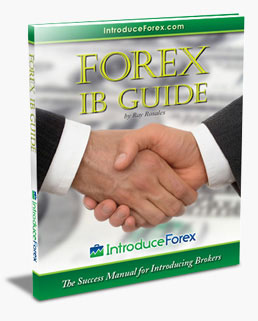What does a Forex IB need to Succeed?
It’s a great question, with many possible answers; answers that, until now, were not readily available to businesses and individuals who wanted to become introducing brokers and operate as such in the foreign exchange market.
Due to a scarcity of how-to information, for over a decade we have witnessed IBs of all shapes and sizes crash and burn. Some of the candidates even showed good potential from the get-go. Nevertheless, they eventually failed for one reason or another.
That is the main reason we published the “Forex IB Guide: The Success Manual for Introducing Brokers.” This practical how-to manual is full of suggestions and tips for IBs to structure and run their business and maximize their success. It is based on proprietary research on hundreds of candidates who have tried their hand at referring investors and traders to the FX market for profit.
Content of the IB Guide
Even though the guide provides over 30 pages of detailed content on the IB business, it does so while attempting to minimize the use of industry jargon and complicated, non-practical information.
After laying down some of the basics for those who are inexperienced in the IB space, the manual provides a list of existing businesses that can likely succeed as introducing brokers. Despite the fact that a successful IB can come from any field, we believe that a greater probability of success is possible if a potential candidate has business experience that’s related to that indicated in the guide.
The manual then goes on to cover the keys to success in the IB industry, as well as provide a list of services forex clients find valuable; services that can be offered by introducing brokers as incentives to make their businesses stand out. In an ultra competitive industry like forex, an IB’s business can easily become commoditized and fail. Continuously finding ways to provide value to their customers is the most natural course of action for an introducing broker to maximize the lifespan of their operation.
Once someone considering to become an IB knows the type business experience that is favorable to success and the different value-added services they should be offering to clients, they’ll have a much better idea whether a business in foreign exchange is for them or not. Even though this might provide a rude awakening to some, it’ll save many business owners that should not be participating in forex plenty of time, money and headaches.
Other important topics covered in the manual are compensation, partnering with a good brokerage firm, and regulation. A lack of experience when it comes to any of these areas can easily cause even the most talented IB to fail.
Who Needs the IB Guide?
The IB guide can actually help a wide range of IBs, from the new participant who wants a complete roadmap to model their business after to the existing IB who has grown stagnant and needs fresh business ideas to spice things up again.
The reality is that forex brokers, an essential variable in the IB business equation, are not really training their IBs or empowering them with the information or training necessary to run their referral businesses efficiently and successfully. Regulatory agencies, like the CFTC (Chicago Futures Trading Commission), NFA (National Futures Association) and FCA (Financial Conduct Authority, previously FSA), who are mainly focused on legal and compliance related issues, aren’t providing much education either. Consequently, it is no surprise that the failure rate of IB businesses in FX is so high.
The guide attempts to correct this problem. That is why any IB who is serious about their business should read it.
To learn more information about the IB guide and how to download it for free, please visit this page.


